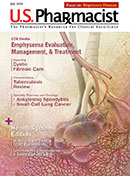The need is great for the continued development of new pneumococcal vaccines with expanded serotype coverage, according to recent research emphasizing the potential to prevent a substantial burden of disease in adults.
Vanderbilt University Medical Center–led researchers conducted a prospective surveillance study in Tennessee and Georgia between 2018 and 2022, finding that about 12% of adults hospitalized with community-acquired pneumonia (CAP) had Streptococcus pneumoniae detected. Of those, more than one-third of the detected pneumococcal serotypes were not contained in currently licensed pneumococcal conjugate vaccines (PCVs) PCV15 and PCV20.
“Understanding the pneumococcal serotypes causing community-acquired pneumonia (CAP) is essential for evaluating the impact of pneumococcal vaccines,” study authors wrote in Clinical Infectious Diseases.
The prospective surveillance study of adults hospitalized with CAP was focused on three hospitals in Tennessee and Georgia between September 1, 2018, and October 31, 2022. The study team assessed for pneumococcal etiology with cultures, the BinaxNOW urinary antigen detection tests, and serotype-specific urinary antigen detection assays that detect 30 pneumococcal serotypes contained in the then-investigational PCV V116, as well as licensed vaccines PCV15 and PCV21 (except serotype 15B).
The researchers then calculated the distribution of pneumococcal serotypes based on serotype-specific urinary antigen detection results.
The results indicated that among 2,917 hospitalized adults enrolled with CAP, 352 (12.1%) patients had S pneumoniae detected, including 51 (1.7%) patients with invasive pneumococcal pneumonia. The researchers reported that the eight most commonly detected serotypes were 3, 22F, 19A, 35B, 9N, 19F, 23A, and 11A.
Of the patients with CAP, “272 (9.3%) had a serotype detected that is contained in PCV V116, compared to 196 (6.7%) patients with a serotype contained in PCV20 (P <.001), and 168 (5.8%) patients with a serotype contained in PCV15 (P <.001),” according to the report.
In addition, a serotype contained in PCV V116 but not PCV15 or PCV20 was detected in 120 (4.1%) patients, representing 38.0% of serotype detections.
Merck recently announced that the FDA has approved V116, marketed as Capvaxive (pneumococcal 21-valent conjugate vaccine), for:
• Active immunization for the prevention of invasive disease caused by S pneumoniae serotypes 3, 6A, 7F, 8, 9N, 10A, 11A, 12F, 15A, 15B, 15C, 16F, 17F, 19A, 20A, 22F, 23A, 23B, 24F, 31, 33F, and 35B in individuals aged 18 years and older
• Active immunization for the prevention of pneumonia caused by S pneumoniae serotypes 3, 6A, 7F, 8, 9N, 10A, 11A, 12F, 15A, 15C, 16F, 17F, 19A, 20A, 22F, 23A, 23B, 24F, 31, 33F, and 35B in individuals aged 18 years and older.
The approval follows the FDA’s Priority Review of Merck’s application. As of late June, the CDC recommends PCV21 as an option for adults aged 19 years or older who currently have a recommendation to receive a dose of PCV.
Background information in the research article noted that PCVs “have greatly benefited human health, most notably in the reduction of invasive pneumococcal disease and pneumonia. However, despite pneumococcal vaccination programs for both children and adults, Streptococcus pneumoniae continues to cause a substantial burden of severe disease in the United States.”
The content contained in this article is for informational purposes only. The content is not intended to be a substitute for professional advice. Reliance on any information provided in this article is solely at your own risk.
Published August 7, 2024






